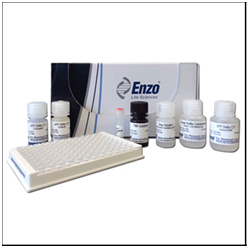| 产品编号 | 产品名称 | 产品规格 | 产品等级 | 产品价格 |
| ADI-900-227-0001 | APP ΔC31 ELISA kit 淀粉样前体蛋白片段检测试剂盒 |
96 wells | – | – |
- 产品特性
- 相关资料
- Q&A
- 参考文献
淀粉样前体蛋白片段检测试剂盒
APP ΔC31 ELISA kit
该试剂盒是首次进入市场的高灵敏度ELISA 试剂盒,用于APP ΔC31 的定量检测。APP ΔC31 是一种重要的淀粉样前体蛋白(APP) 片段,具有独特的促凋亡机制,可导致阿尔茨海默病。
◆原理
阿尔茨海默病AD 是一种神经退行性疾病,特征为老年斑,神经原纤维缠结以及神经突触和神经元的损失。阿尔茨海默病AD 已经被广泛地视为由淀粉样蛋白β(Aβ) 在大脑内的聚集导致。该蛋白聚集会与有害金属和活性氧等结合,直接损害细胞膜,从而导致脑细胞的损伤。最近研究表明Aβ 肽是一种非病理性多功能肽,它与AD 关联的主要原因是可以与其它蛋白结合,如淀粉样前体蛋白(APP)。这种蛋白之间的相互结合打乱了正常记忆形成和遗忘的平衡。 这正是通过Aβ 肽和APP 的相互作用,Aβ 肽能影响APP 信号的正常调控,从而在AD 的发病机理中起指示作用。
◆特点•优势
● 高灵敏度——可监测低至 0.92 pM 的 APP ΔC31
● 高精确度——可进行完全定量检测,比免疫印迹等半定量结果准确
● 高通量——2 小时内即可进行 38 个样品的重复检测
● 高特异性——与 APP亚基类似物交叉反应低
● Amp’d ™认证——可用于更低浓度 APP ΔC31样品的检测,灵敏度增加
10 倍 ( 从 0.92 pM 至 0.094 pM)
APP ΔC31 ELISA kit 是一个完整的比色法检测ELISA 试剂盒,用于人细胞裂解液和脑脊髓液中APP ΔC31 的定量检测,2小时即可获得实验结果。该试剂盒用于APP ΔC31 裂解产生的APP 片段的特异性检测。当与阿尔茨海默病其它相关蛋白 (Aβ40/42,sAPPα and tau/p-tau) 检测联用时,可监测阿尔茨海默病的发生和发展。
|
Alternative Name: |
Amyloid precursor protein, APP neo |
|
Sensitivity: |
0.92 pM (range 11.72 – 1500 pM) |
|
Assay Time: |
~2 hours |
|
Applications: |
ELISA, Colorimetric detection |
|
Application Notes: |
For the quantitative determination of human APP ΔC31 in cell lysate, cerebral spinal fluid, plasma and serum samples. Sequence alignments indicate multiple species are probable. |
|
Species reactivity: |
Human |
|
Shipping: |
Blue Ice Not Frozen |
|
Long Term Storage: |
+4°C |
|
Kit/Set Contains: |
Microtiter Plate, Assay Buffer, Standard, Detector Antibody, Antibody-HRP-conjugate, TMB Substrate, Stop Solution, Wash Buffer Concentrate |
|
Scientific Background: |
Alzheimer’s disease (AD) is a progressive neurodegenerative disease characterized by the senile plaques, neurofibrillary tangles and loss of synapses and neurons. AD has been largely viewed as a disease of toxicity being mediated by the accumulation of the amyloid beta (Aβ) peptide as plaques within the brain resulting in damage to brain cells from the binding of damaging metals, reactive oxygen species production and direct damage to cellular membranes. Recent research has suggested that the Aβ peptide is a multifunctional peptide with non-pathological effects and that its association with AD is in conjunction with its roles in combination with other proteins such as the amyloid precursor protein (APP) resulting in the imbalance between the processes of memory formation and normal forgetting. It is through the interactions of the Aβ peptide with APP that the Aβ peptide itself can affect normal modulation and signaling of APP resulting in its indicated role in the pathogenesis of AD via signaling effects rather than chemical or physical effects. |
|
Technical Info/Product Notes: |
Application Notes |
|
UniProt ID: |
P05067 |
